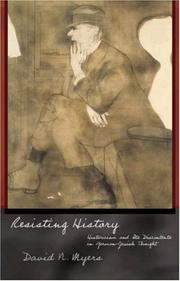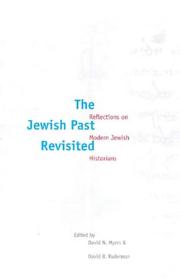| Listing 1 - 10 of 24 | << page >> |
Sort by
|
Book
ISBN: 9780691146607 Year: 2003 Publisher: Princeton Princeton university press
Abstract | Keywords | Export | Availability | Bookmark
 Loading...
Loading...Choose an application
- Reference Manager
- EndNote
- RefWorks (Direct export to RefWorks)
"Resisting History examines the backlash against historicism, focusing on four major Jewish thinkers. David Myers situates these thinkers in proximity to leading Protestant thinkers of the time, but argues that German Jews and Christians shared a complex cultural and discursive world best understood in terms of exchange and adaptation rather than influence." "After examining the growing dominance of the new historicist thinking in the nineteenth century, the book analyzes the critical responses of Hermann Cohen, Franz Rosenzweig, Leo Strauss, and Isaac Breuer. For this fascinating and diverse quartet of thinkers, historicism posed a stark challenge to the ongoing vitality of Judaism in the modern world. And yet, as they set out to dilute or eliminate its destructive tendencies, these thinkers often made recourse to the very tools and methods of historicism. In doing so, they demonstrated the utter inescapability of historicism in modern culture, whether approached from a Christian or Jewish perspective."--Jacket.
Historicism --- Historicism. --- Historicisme --- Historisme. --- Jewish learning and scholarship --- Jewish learning and scholarship. --- Jews --- Joodse filosofie. --- Judaism --- Judaïsme --- Juifs --- History. --- Histoire. --- History --- Intellectual life --- Historiography. --- Historiographie. --- Savoir et érudition --- Histoire --- Breuer, Isaac, --- Cohen, Hermann, --- Rosenzweig, Franz, --- Strauss, Leo --- Strauss, Leo. --- Et l'historicisme. --- 1800-1999. --- Germany.
Book
ISBN: 9781584657361 1584657367 Year: 2008 Publisher: Waltham, Mass.: Brandeis University Press,
Abstract | Keywords | Export | Availability | Bookmark
 Loading...
Loading...Choose an application
- Reference Manager
- EndNote
- RefWorks (Direct export to RefWorks)
Zionists --- Emigration and immigration --- Arab-Israeli conflict --- Rawidowicz, Simon, - 1897-1957 --- Israel
Book
ISBN: 9780195098426 Year: 1995 Publisher: New York (N.Y.) : Oxford university press,
Abstract | Keywords | Export | Availability | Bookmark
 Loading...
Loading...Choose an application
- Reference Manager
- EndNote
- RefWorks (Direct export to RefWorks)
David Myers' book explores a fascinating and untold chapter in modern Jewish intellectual history: the role of the first generation of Jewish scholars at the Hebrew University in Jerusalem in establishing Jewish studies within framework of a Jewish national university. committed to rewriting Jewish history according to zionist standarts, these "Jerusalem scholars" richly reflect the tensions that attended their dual allegiances, to both zionism and the discipline of history.
15.01 historiography. --- Geschichtsschreibung. --- Geschiedschrijving. --- Jewish learning and scholarship --- Jewish learning and scholarship --- Jewish learning and scholarship --- Jewish learning and scholarship --- Jewish learning and scholarship --- Jewish learning and scholarship --- Jewish learning and scholarship. --- Jewish scholars --- Jewish scholars --- Jewish scholars. --- Jews --- Jews --- Jews --- Jodendom. --- Juden. --- Zionism --- Zionism --- Zionism --- Zionisme. --- Zionismus. --- History --- History --- History --- History --- History --- History --- History --- History --- Historiography. --- Historiography. --- Historiography. --- Historiography. --- Historiography. --- Historiography. --- Freie Universität Berlin --- Hebrew University --- Jerusalem / Hebräische Universität. --- The Hebrew University of Jerusalem. --- Universiṭah ha-ʻIvrit bi-Yerushalayim --- Universiṭah ha-ʻIvrit bi-Yerushalayim. --- Universiṭah ha-ʻivrit bi-Yerushalayim --- ha-Universiṭah ha-ʻIvrit bi-Yerushalayim. --- History. --- History. --- 1800-1999. --- Europe. --- Jerusalem. --- Middle East

ISBN: 0691115931 Year: 2003 Publisher: Princeton (N.J.): Princeton university press
Abstract | Keywords | Export | Availability | Bookmark
 Loading...
Loading...Choose an application
- Reference Manager
- EndNote
- RefWorks (Direct export to RefWorks)
Nineteenth-century European thought, especially in Germany, was increasingly dominated by a new historicist impulse to situate every event, person, or text in its particular context. At odds with the transcendent claims of philosophy and--more significantly--theology, historicism came to be attacked by its critics for reducing human experience to a series of disconnected moments, each of which was the product of decidedly mundane, rather than sacred, origins. By the late nineteenth century and into the Weimar period, historicism was seen by many as a grinding force that corroded social values and was emblematic of modern society's gravest ills. Resisting History examines the backlash against historicism, focusing on four major Jewish thinkers. David Myers situates these thinkers in proximity to leading Protestant thinkers of the time, but argues that German Jews and Christians shared a complex cultural and discursive world best understood in terms of exchange and adaptation rather than influence.After examining the growing dominance of the new historicist thinking in the nineteenth century, the book analyzes the critical responses of Hermann Cohen, Franz Rosenzweig, Leo Strauss, and Isaac Breuer. For this fascinating and diverse quartet of thinkers, historicism posed a stark challenge to the ongoing vitality of Judaism in the modern world. And yet, as they set out to dilute or eliminate its destructive tendencies, these thinkers often made recourse to the very tools and methods of historicism. In doing so, they demonstrated the utter inescapability of historicism in modern culture, whether approached from a Christian or Jewish perspective.
Historicism --- Jewish learning and scholarship --- Judaism --- History --- Historiography --- Breuer, Isaac, --- Cohen, Hermann, --- Rosenzweig, Franz, --- Strauss, Leo. --- History. --- Historiography. --- Agudat Yisrael. --- Balfour Declaration. --- Benjamin, Walter. --- Breuer, Salomon. --- Cassirer, Ernst. --- Conservative Revolution. --- Davos conference. --- Denominationalism. --- Dilthey, Wilhelm. --- Ehrenfreund, Jacques. --- Enlightenment. --- Erets Yisrael. --- Fischer, Kuno. --- Frankfurt am Main. --- Funkenstein, Amos. --- Geiger, Abraham. --- Geisteswissenschaft. --- Guttmann, Julius. --- Hegelianism. --- Heidegger, Martin. --- Jewish nation. --- Jewishness. --- Kassel. --- Kellerman, Benzion. --- Kierkegaard, Søren. --- Kulturprotestantismus. --- Lazarus, Moritz. --- Luther, Martin. --- Marr, Wilhelm. --- Meinecke, Friedrich. --- Naturwissenschaft. --- Neue Kusari. --- Nordau, Max. --- Otto, Rudolf. --- Rabbinic Judaism. --- Revelation. --- Rosenheim, Jacob. --- Scholem, Gershom. --- Uganda proposal. --- anti-historicism. --- assimilation. --- biblical prophets. --- communitarianism. --- conversion to Christianity. --- cultural bifocality. --- ecclesiastical history. --- historical Jesus movement. --- historicism. --- philosophy. --- positivism. --- post-structuralism. --- systematic theology.
Book
ISBN: 0300231407 Year: 2018 Publisher: New Haven, CT : Yale University Press,
Abstract | Keywords | Export | Availability | Bookmark
 Loading...
Loading...Choose an application
- Reference Manager
- EndNote
- RefWorks (Direct export to RefWorks)
A leading scholar of Jewish history's bracing and challenging case for the role of the historian today Why do we study history? What is the role of the historian in the contemporary world? These questions prompted David N. Myers's illuminating and poignant call for the relevance of historical research and writing. His inquiry identifies a number of key themes around which modern Jewish historians have wrapped their labors: liberation, consolation, and witnessing. Through these portraits, Myers revisits the chasm between history and memory, revealing the middle space occupied by modern Jewish historians as they work between the poles of empathic storytelling and the critical sifting of sources. History, properly applied, can both destroy ideologically rooted myths that breed group hatred and create new memories that are sustaining of life. Alive in these investigations is Myers's belief that the historian today can and should attend to questions of political and moral urgency. Historical knowledge is not a luxury to society but an essential requirement for informed civic engagement, as well as a vital tool in policy making, conflict resolution, and restorative justice.
Jews --- Historiography.
Book
ISBN: 9780199730988 Year: 2017 Publisher: Oxford United Kingdom Oxford University Press Oxford
Abstract | Keywords | Export | Availability | Bookmark
 Loading...
Loading...Choose an application
- Reference Manager
- EndNote
- RefWorks (Direct export to RefWorks)
Book
ISBN: 9781400832569 Year: 2022 Publisher: Princeton, NJ
Abstract | Keywords | Export | Availability | Bookmark
 Loading...
Loading...Choose an application
- Reference Manager
- EndNote
- RefWorks (Direct export to RefWorks)
Digital
ISBN: 9781400832569 Year: 2022 Publisher: Princeton, N.J. Princeton University Press
Abstract | Keywords | Export | Availability | Bookmark
 Loading...
Loading...Choose an application
- Reference Manager
- EndNote
- RefWorks (Direct export to RefWorks)

ISBN: 3406488781 Year: 2002 Publisher: München : C.H. Beck,
Abstract | Keywords | Export | Availability | Bookmark
 Loading...
Loading...Choose an application
- Reference Manager
- EndNote
- RefWorks (Direct export to RefWorks)
Jews --- Judaism --- Zionism --- Holocaust, Jewish (1939-1945) --- Juifs --- Judaïsme --- Sionisme --- Holocauste, 1939-1945 --- Historiography. --- Historiography. --- Historiography. --- Historiography. --- Historiographie --- Historiographie --- Historiographie --- Historiographie

ISBN: 0300072163 Year: 1998 Volume: *1 Publisher: New Haven, Conn. Yale University Press
Abstract | Keywords | Export | Availability | Bookmark
 Loading...
Loading...Choose an application
- Reference Manager
- EndNote
- RefWorks (Direct export to RefWorks)
History as a science --- Jewish religion: persons --- Jewish historians --- Jews --- Judaism --- Biography. --- Historiography. --- History --- Philosophy. --- Biography --- Philosophy --- Historiography --- Jewish historians - Biography.
| Listing 1 - 10 of 24 | << page >> |
Sort by
|

 Search
Search Feedback
Feedback About UniCat
About UniCat  Help
Help News
News